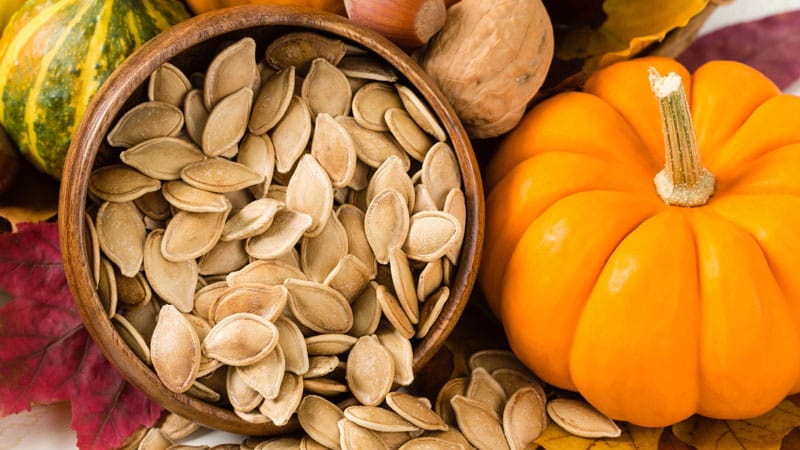
Pumpkin seeds are a top source of zinc, a very important nutrient when it comes to prostate health and preventing prostate enlargement. It’s also a key nutrient for our immune system, our heart, our brain, our muscles, our bones, our DNA, our metabolism, and more. This makes pumpkin seeds a very popular snack! And they’re quite delicious too, whether we eat them raw or roasted, shelled (pepitas) or in their shells.
But pumpkin seeds offer many other nutrients aside zinc. Pumpkin seeds are also rich in protein, omega-6 fatty acids (which we need, from whole sources), copper, iron, magnesium, manganese, phosphorus, and potassium. Based on this nutritional profile, they are also beneficial to our red blood cells, our hormones, our DNA and RNA, our metabolism, our cells in general, and our children’s early development. Plus, studies show that zinc may also help prevent hair loss, and even regain some of the lost hair after 24 weeks of taking 400 mg of pumpkin seed oil. Translated into whole pumpkin seeds, it’s the equivalent of 2 to 3 pumpkin seeds a day!
Watch Out for High-Fat Content
Due to their high-fat content, the recommendation is not to exceed 1/4 cup of total nuts and seeds in one day. So, be sure to add pumpkin seeds to the mix while being mindful of how many you’re eating. They’re so good, you might lose track!
When you buy your pumpkin seeds, make sure they’re not coated in oil to avoid adding extra fat and empty calories. You can always roast your own oil-free pumpkin seeds at home when pumpkins are in season. Simply cut open your pumpkin (or other winter squash), scoop out the seeds, wash them and remove all strings or flesh. Then, season them to your liking and roast them in the oven at 350° F for 15 to 25 minutes. You can also bake the pumpkin or squash and make delicious seasonal dishes or desserts with it.
Nutrition Calculator: Pumpkin Seeds
Use our personalized nutrition calculator to discover the percentage of daily nutrition needs you and your family can get from eating pumpkin seeds.
Nutrition needs vary according to age, sex, and whether women of reproductive age are pregnant or breastfeeding. Fill out the form below for yourself and for your family members to get personalized results.*
* Calculated as a percentage of the Recommended Daily Allowances (RDAs) as established by the U.S. Department of Agriculture and the U.S. Department of Health and Human Services. Based on nutritional information provided by the U.S. Department of Agriculture as an average of multiple pumpkin seeds samples.
References
